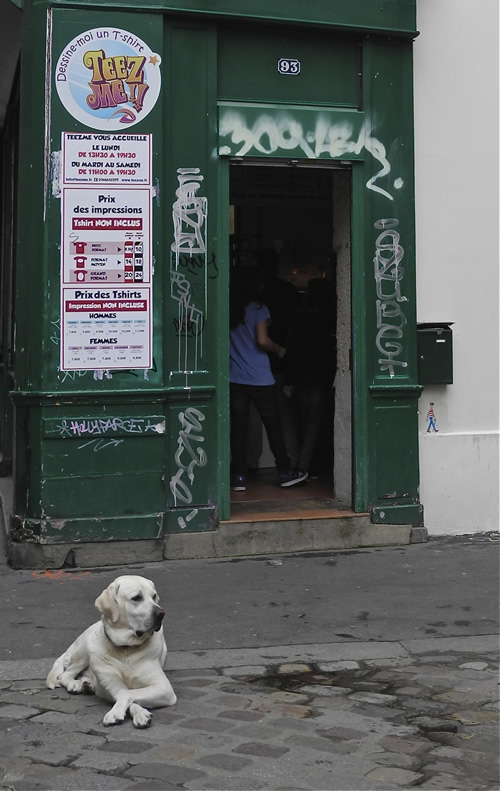
I’ve been mulling over why so many authors I’ve recently read insert a foreign word into the middle of a sentence when there are plenty of good English ones to choose from. It may speak to my choice of authors, but it seems to be a trend. One that is almost as startling to me as why I’ve decided to write a blog. But, back to my original mull: I wonder if I have the nerve to ask if you, my reader, mimic my own somewhat neurotic reading behavior. I get uneasy and prickly when I feel stupid. So, I find myself looking up the italicized (because it’s foreign!) culprit or feign knowledge of the word. I should know this word, damn it! And, lately I’ve come to realize that while the book editor’s job is to save their authors from embarrassment, the general speaker can mutilate a nonnative word by incorrectly inserting the colorful bon mot like a jeweler might string a shiny and therefore distracting bauble onto an otherwise drab strand of beads. Learn a new word? Impressive. Use a foreign word? Über smart. Use an obscure foreign word? Come on. Now you’re just showing off. If I started throwing my weight around with a couple of French verbs, would I gain more readers, status, confidence, or ridicule? I risk being jejune here… so, excuse-moi.

A word of warning when writing without a passport: Know how the word translates. Capisce? A friend of mine likes to say, “Let’s just putz around before lunch.” Does she realize what she’s really saying? Knowing her as I do, I doubt it. ¿Quien sabe? Let’s just say that some Yiddish expressions while tempting to toss in a sentence don’t mean what they sound like. But, knock yourself out, and I’ll stop kvetching.
The addition of a phrase, in any language other than English, can bestow on the writer that je ne sais quoi that most of us have a yen (italics optional) for. The writer, or speaker for that matter, can flirt with foreign vocabulary usage like an American woman might don a scarf while visiting France. Even if her scarf’s label reads Hermes, good luck getting that thing to look as good on her as it does on any French woman. But, for the readers with a street-savvy sense of a couple of languages’ lexicons and who have a command of their correct usages, what glee that must bring to them and those nearby. Good for those readers. What good dinner conversationalists! All that time saved by being au courant. Keeping up with one’s native language is one thing but to manage sifting through one or two more tongues and their vocabulary lists? It’s like a dab of perfume on your neck while you are still wearing sweatpants. You just know you are a better version of yourself for making the effort. So few of us do. Who has the time?

This lingo litmus test arises time after time for me when I come up dry trying to complete the New York Times crossword puzzle. Why didn’t I just try harder, I ask myself, to learn the now ubiquitous code letters for texting? For me, texting is a novel and foreign language. It seems like it should be easier than it is to remember 3 or 4 letters in a particular order. No wonder emojis are overused by my generation. I used to feel this kind of inferiority about Greek mythology puzzle clues. 45 across, 4 letters, Greek top dog: Right you are. Zeus it is; you paid attention in sixth grade. Now, though, the puzzles include texting references that I can’t learn fast enough. Worse yet, it doesn’t stick 🙁. If you are too busy to type Thank You (TY) then what else are you doing? Driving? Don’t get me started on leaving off the period at the end of your text. Did you realize this is up for discussion? Well, it is… LOL.

So if this blog doesn’t grab you because it is too mundane, too obtuse, too old-school, or too uni-lingual, then maybe I can appeal (in a last ditch effort) to your anti-Trump sentiments and give immigrants their due. Somebody should. After all, most of us can count only one or two generations past to a time when our ancestors were schlepping their candlesticks and bibles across the tundra and up the gangplank to board a ship bound for freedom or at least for less oppressive conditions. Wrapping up their precious belongings in some tattered rags (schmattas, if you will), they didn’t worry about switching out SIM cards, establishing global calling plans, or avoiding cellular data overcharges. Instead, families bundled up their hopes, dreams, beliefs, and languages. Most of them expressed these orally, whispering their precious memories to their children, reciting their sacred prayers alongside aging parents, codifying recipes to those hungry enough to want to keep alive forever the flavors and tastes of home. To them, of course, their oral traditions weren’t foreign at all. They managed to communicate their frustrations, fears, morals and thrills using their own lingo. They sang and danced to songs unfamiliar to most anyone else. But, as they got to know their tenement neighbors because they desperately needed each other, they overheard arguments, borrowed sugar and shared meals; they babysat each other’s children, and within a short period of time, boundaries blurred and the foreign became the new normal. People and their languages blended and enriched an entire country because of it.

Language is a beautiful, living thing. And words from far away lands and expressions from the social media galaxy make us feel and act more like the global citizens we’ve come to be. Ironically, I rarely speak to my neighbors, but the realization that I can communicate speedily (thanks Google) using an impressive array of nonnative words (thanks Google Translate) to friends everywhere in the world never ceases to amaze me. My communiqués to friends in Japan or Israel or France, for that matter, probably end up looking as weird and clunky to native speakers in those countries as my local Chinese restaurant menu does to me. But, what’s more important in the case of that menu: correct spelling or a tasty dish? Oh, yeah, and good service. And, it helps to know a few folks 30 years younger than yourself just so you can hear the way language has morphed into an even more vibrant and robust accumulation of luscious, hysterical, and graphic vocabulary and creative syntax. There’s a really tasty dish.

It’s literally about getting the word out there, right? It’s about establishing contact and relationships and building bridges to far-away places and distant-feeling generations. In fact, that’s the impetus behind this blog: to share what’s on my mind while using mostly complete sentences with a majority of English words a lot of the time. But, I can’t promise. Let’s see how it goes. C’est la vie.
Cream and Sugar,


I love this! Keep drinking coffee & writing – & use as many foreign words as you like. Cuz that’s a great way to feel connected to the world – which may save us in the end! You have found yet another mileau for your uniqueness. Viva Naomi!
You are too cute! You braved the new world to write me a comment and I love you for it. Thanks for the support, dear blood sister.
Welcome to the blogosphere, Nomi!! Can’t wait to read all your witty and poignant musings. I know I’ll enjoy shpatzeering around your blog, bien sur! Signing up now…
xx
Oy vey! I’m just happy you don’t think I’m a schmendrick. That is really a relief. Meet you in the b-sphere!
Fabulous, dear Naomi! You write so well and I will love reading a blog that isn’t based on tales of creeping slowly up a hot hill, looking for someone who’d like to meet a very cute little dog!
“Bon chance”on this new endeavor and Traveler sends his love too! BB
Your blog is a tough one to compete with, you biking babe! Tell Traveler, please, I also speak fluent dog.
Brilliant idea. You are an amazing writer.
Jen, thank you! I loved that you enjoyed it.
Love the look of your blog and your way with words, both foreign and domestic!
Thank you so much! I guess it easier to write than to pack my bags.
Congratulations Naomi! Can’t wait to read more!
Sarah, the blogmeister to the stars! You are my good fairy and I appreciate your taking the time to comment.
This is awesome Naomi.
Anxious for more
Sharon, my dear friend, thank you for reading this and commenting both here and privately too!
Do you believe as I got this email, I was just about to email you because I need some decadent chocolate coffee cake and your company to go with it.. I thoroughly enjoyed your blog and it’s the perfect venue for sharing your quick wit and talent for writing. Re-inventing yourself ….. Carpe’ Diem!
PS Marty…good photos!
Pal, I’ve carped some diems and it’s fun to share them all with you. Maybe one day, after this re-invention business, I might get it right. There’s always mañana!
Brava!!
Doreen, I’m so happy you enjoyed the entry. Thanks for taking the time to read it! XO
“To love someone is to learn the song in their heart and sing it to them when they have forgotten it” …anonymous
Thank you, Nomi, for iluminating a primal need that we have as human beings..to love and be loved. The way we do that is in relationship, with ourselves, one another and our environment.
What i have discovered is that our willingness to take time to cultivate awareness along with pathways to communicate, especially at those times when we disagree, grows us as human beings and global citizens, xwendy
I am overwhelmed by your words, dearest Wendy. I like being a citizen in YOUR world, I can tell you that. XO
Great job on the new blog. Let your words fly!
Thanks, Mitch. I appreciate your supportive words and incredibly supportive tech help!
What fun! Brilliant, clever writing, a joy to read! Thank you Nomi!
I am so happy you read and liked it, Libby! I think about your mum and her use (and application) of lippy…when she needed lipstick! Now, there’s a very cool word!
Cuz, am I ‘sposed to read Column One completely before progressing over to Column Two? Or bounce back and forth until I arrive happily at the cream and sugar? I think the former, but, like you, I dislike encountering evidence of my own stupidity.
So happy you’re doing this!
XOXO
PS Nice shots, Marty!
Thanks so much, Cuz! It is an up-and-down exercise in reading. Let me review the layout at your wise suggestion…
Okay, I confess to the every-so-often disappearing period at the end of a sentence, only if the end of a paragraph. I’ve joined the younger generation’s quest for speed writing. In the ’60s we had shorthand but now 20 dropped periods leaves time for one more yogic breath, two more “okay bye bye love yas.” Next thing you know we’ll drop the vowel! Btw, yr wrtngs btfl! Cnt wt fr nxt wks blg! LOL
Jany (Little Old Lady)
You need your own blog, oh-so-clever one. Then, you could do both: add/delete periods with ease AND take deep yoga breaths as needed. Why not?
Thanks for your fun comment.
ThinReds – I’m pleased to see that you continue to not leave a pun unturned. Good job.
What? Ignore a pun? Never! Thanks for your fun comment, John!
Nice words, Nice images…….
Viva la Blog!!
I’m so happy you enjoyed the one-two Rayman punch!
You have a great talent for writing
I am thrilled you enjoyed the blog. Thanks!
This is what writing is all about! Thank you for letting me be a part of it.
xxoo
Mo
I’m so happy you enjoyed the blog. Thank you for your comments and for being a part of it 😉
That’s quite a Sabbath production Naomi! Your dedication to process and experience is impressive.
Hey, Jan. So fun that you wrote to me with your comments. I was thinking last night, as we were missing Mitch at our table, how much more fun it is to cook along side friends and family. Sure, it is great to be able to welcome them to the table having done all the work, but it is such a different pleasure to create meals together. Experimentation isn’t as daunting, for sure. And you can always blame someone else if things don’t turn out so well. XO
I learned on a 55 Chevy column stick. I didn’t get my own car until second year in college, a used, dowdy, dumpy Plymouth Valiant. I think my Dad got me that not only because it was cheap, but because it was so unfashionable that I couldn’t possibly be considered cool enough for a pick up attempt when driving it!
Ha! Well, fathers can be so short sighted!!!! Papa’s Got A Brand New…etc. You probably were cool no matter what wheels you were driving. And, anyway, baby look at you now, right?
Ah, the column stick!!!! I hadn’t thought of that. My father had a car, once, where there were buttons you pushed to put the car into gear. Oh, and he also had a hard-top convertible. My mother was no mad because there was no room for luggage in that car. Good times. And fun sharing memories with you. I hear you are off to where they drive on the wrong side of the road. Have fun! XO
Just loved, loved the column about the south. Talk about painting word pictures!! Marty, loved your pictures too but wish you’d included one of the fried bologna sandwich. Did it come with Velveeta?
No Velveeta. I mean, come on! It was a Gourmet honky tonk, sister. The bar stool was barely wide enough to accommodate my tush. I can tell you that. But the bar stools got bigger the farther south we went, fortunately. My tush too!
Thanks so much for reading the post and for your kind comments, Jan. I imagine your trip was equally fascinating. Can’t wait to hear all about it.
XO Miss Marty
Oy, yes “Let’s just putz around before lunch,” indeed. Someone in my life used the word in the same manner, and I was, oh, so helpful, in telling him what he said and then letting him know to say “futz”. I do not even remember who this was, and I am guessing he has obliterated me from his memory as well, but sometimes you just have to instruct – for the sake of the putz who does not know what it means. Personally, I love being corrected. I consider every corrected mistake another semester at Harvard.
Ah, I presume you are referring to my first blog post. Thanks for reminding me about it and what fun it was to make fun of others. Just kidding…or, am I?
Love that you commented here, Janet. And, your thoughts on being corrected: that’s really a good way to process criticism. Think of the Harvard tuition we save by just considering corrections as constructive.
I appreciate your checking in and letting me know you enjoyed the post. XO
Nomi,
Ah, the dreaded name game! Mine was Brandwein, pronounced brand-wine, not brandween or bandyween or brandywine. My family lore refers to Ellis Island too, the story being that the original Brandtvein (brant-vine) was too complicated so they changed it but I fail to see how Brandwein made it any easier!
And, O Kee, I was a girl scout, probably the only red headed Jewish one in the group.
Loved the piece. keep it up,
Jan
Jan, you always are so supportive and write the best comments! Thank you. What I’m reading from folks’ comments is what I now sense to be true. No matter your name, your hair color, your weight, etc., teenage years are just plain traumatic. P.S. There were three of us Jews in Campfire Girls–almost a minyan! XO